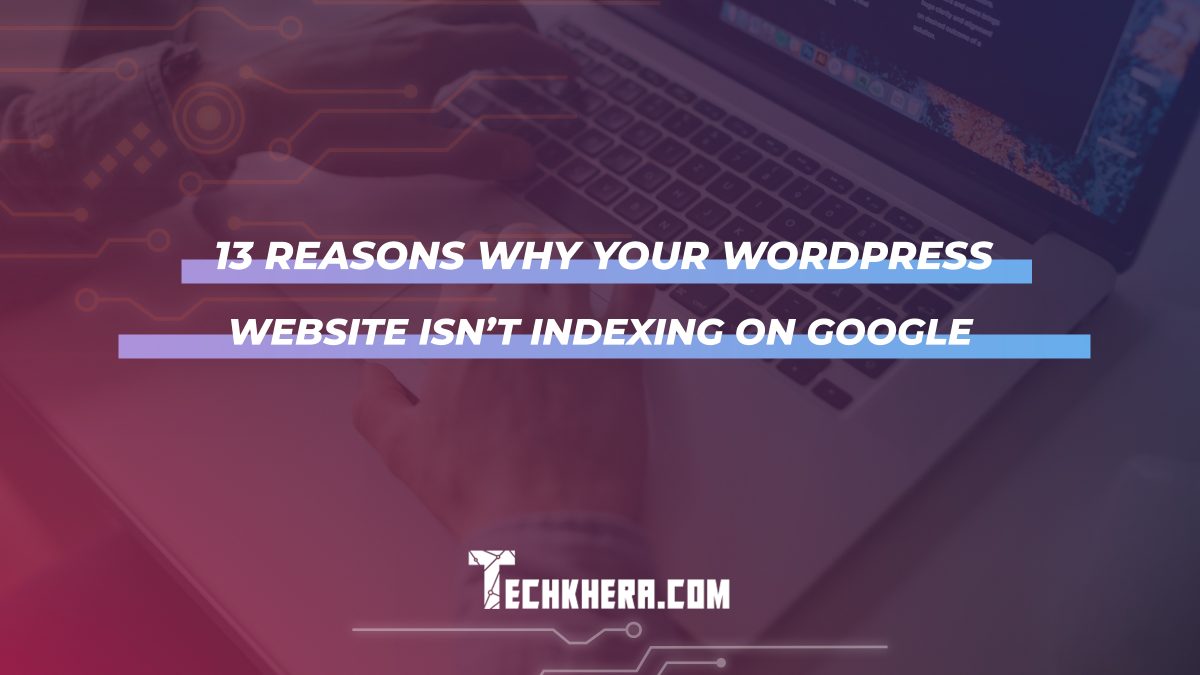
13 Reasons Why Your WordPress Website Isn’t Indexing on Google
In today’s digital landscape, having your website indexed by search engines is crucial for visibility and online success. However, if your WordPress website isn’t showing up in Google’s search results, it can be a cause for concern. There could be various reasons behind this issue. In this article, we’ll delve into 13 common factors that might be preventing your WordPress website from being indexed by Google and how to address them.

Contents
- 1 1. Misconfigured Search Engine Visibility Settings
- 2 2. Robots Meta Tag Noindex
- 3 3. XML Sitemap Errors
- 4 4. Blocked by Robots.txt File
- 5 5. Incorrect Canonical Tags
- 6 6. Slow Page Load Times
- 7 7. Thin or Low-Quality Content
- 8 8. Issues with Mobile Friendliness
- 9 9. Issues with SSL/HTTPS
- 10 10. Domain Name and DNS Issues
- 11 11. Manual Actions by Google
- 12 12. Server Issues or Downtime
- 13 13. New Website or Content
1. Misconfigured Search Engine Visibility Settings
WordPress provides an option to discourage search engines from indexing your site. This setting can be found in the WordPress dashboard under “Settings” > “Reading”. Make sure the checkbox labeled “Discourage search engines from indexing this site” is unchecked.
2. Robots Meta Tag Noindex
Inspect the HTML code of your pages to ensure there isn’t a noindex meta tag inadvertently applied. This tag instructs search engines not to index a page, which can significantly impact your visibility on Google.
3. XML Sitemap Errors
A sitemap is a file that lists all the pages of your website. It helps search engines understand the structure and content of your site. Use a plugin like Yoast SEO to generate and submit a sitemap to Google Search Console. Regularly update it to reflect your current content.
4. Blocked by Robots.txt File
Your website’s `robots.txt` file can unintentionally prevent search engines from crawling and indexing certain pages. Make sure this file doesn’t accidentally block important content.
5. Incorrect Canonical Tags
Canonical tags are used to indicate the preferred version of a page when there are multiple versions (e.g., HTTP vs HTTPS, www vs non-www). Confirm that these tags are set correctly in your pages’ HTML code.
6. Slow Page Load Times
Google gives priority to fast-loading websites. Use tools like Google PageSpeed Insights to identify and fix any speed-related issues. This can have a significant impact on your site’s indexing and overall user experience.
7. Thin or Low-Quality Content
Google favors high-quality, original content. If your content is deemed low-value or contains duplicate information, it may not be indexed. Focus on creating informative, well-researched, and engaging content that adds value for your audience.

8. Issues with Mobile Friendliness
With the mobile-first indexing approach, Google prioritizes mobile-friendly websites. Ensure your WordPress theme is responsive and provides a seamless experience on mobile devices.
9. Issues with SSL/HTTPS
Google prefers secure websites (those using HTTPS). Ensure you have an SSL certificate installed and correctly configured on your site. This not only aids in indexing but also boosts the overall security of your site.
10. Domain Name and DNS Issues
Incorrect DNS settings or problems with your domain registrar could hinder your website from being indexed. Double-check your domain settings to ensure they are configured correctly.
11. Manual Actions by Google
If Google detects a violation of its guidelines, they may impose a manual penalty, preventing your site from being indexed. Check Google Search Console for any notifications or manual action reports.
12. Server Issues or Downtime
Frequent downtime or slow server response times can hinder Google’s ability to access and index your content. Consider upgrading your hosting or consulting with your hosting provider to ensure your website is consistently accessible.
13. New Website or Content
It takes time for Google to discover and index new websites or content. Be patient, and consider using Google Search Console to request indexing of specific pages.
In conclusion, if your WordPress website isn’t indexing on Google, there are several potential culprits to investigate. By systematically addressing these issues, you can improve your website’s visibility in search results. Regularly monitoring tools like Google Search Console and adhering to best SEO practices will also contribute to a well-indexed and highly visible website. Remember, patience is key, as it may take some time for changes to take effect and for your website to start appearing in search results.
